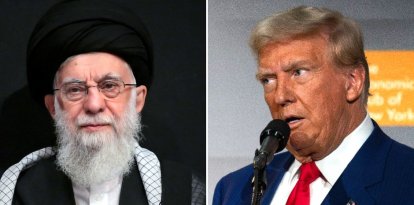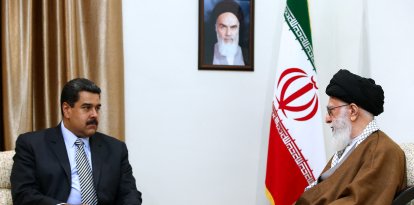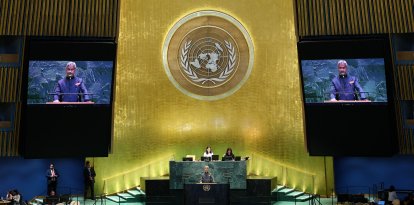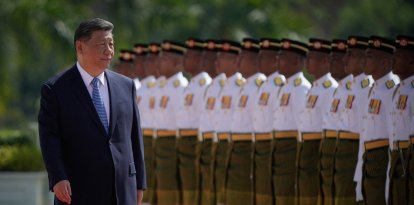Politics and religion are the undisputed protagonists of 'Dune: Part 2'
Denis Villeneuve's movie, starring Timothée Chalamet and Zendaya, hits theaters on Friday, March 1.

(Cordon Press)
2023 will be remembered in the cinematographic field for the unprecedented success of Barbie and Oppenheimer. Due to the strike, the other big anticipated movie of the year was postponed until Friday, March 1: Dune: Part 2.
The continuation of the 2021 hit is about to hit the big screen and has one goal. It wants to prove wrong a common belief in movie sagas: "Second parts were never good." Dune: Part 2 is debunking the cliché.
The movie starring Timothée Chalamet and Zendaya is much more entertaining than its first part. This movie doesn't focus as much on the planet of Arrakis. This movie doesn't have as much of a political component, which could be a flaw, although it does help the plot move along.
Paul Atreides' morality is tested in 'Dune: Part 2'
The main characters go through unprecedented changes. In the first movie, we met an inexperienced Paul Atreides who was trying to understand his situation. In Dune: Part 2 the character played by Timothée Chalamet has matured, although he still doesn't believe who he is. We see this struggle throughout this movie and that plays a big part of the plot.

Timothée Chalamet is Paul Atreides in 'Dune: Part 2'.
(Cordon Press)
However, it limps a bit perhaps its darker version. One that, in the book, stands out a lot and that here loses strength perhaps because even during those dark parts we can see how the character tries to remain morally good.
The political-religious component is fundamental in 'Dune: Part 2'
Choni, played by Zendaya, also evolves. Zendaya's character proves to be a strong woman, with her own ideas and, most importantly in Arrakis, she is independent. She does not need anyone and despite being proud of her culture and her people, she doesn't hesitate to try and help her community. One way she does this is by involving Paul in the famous prophecy, which she herself does not believe.

Zendaya plays Choni in 'Dune: Part 2'
(Cordon Press)
Unlike Choni, the characters Jessica Atreides and Stilgar, played respectively by Rebecca Ferguson and the Spanish Javier Bardem, fervently believe in the prophecy. The movie's political framework also has an important religious component.

On the left Rebecca Ferguson; On the right, Javier Bardem playing Jessica Atreides and Stilgar in 'Dune: Part 2'
(Cordon Press)
The plot revolves around religion and whether or not to believe in Paul's prophecy. This even affects the villains, played by the brilliant Austin Butler, Florence Pugh and Dave Bautista. In the end, all his actions are also aimed at ending the danger that Paul poses not only on a warrior level but especially as someone who is capable of recruiting the masses and getting them to fight on his side.

Austin Butler plays Feyd-Rautha Harkonnen in 'Dune: Part 2'
(Cordon Press)
"The best science fiction movie"
All this is brilliantly wrapped up in a movie that could be Denis Villeneuve's best work yet. The director, aware of the importance of Frank Herbert's book, allocated a large part of his budget to the setting and sets. This makes the planet of Arrakis shine.

The setting and creatures of Arrakis, one of the strong points of 'Dune: part 2'
(Cordon Press)
The same thing is true with music. The filmmaker worked with Hans Zimmer who added his musical touch which goes perfectly with the multiple plot lines. He manages to combine his music with a language completely made up for the movie. The only really important drawback lies in the duration of the movie, which is nearly three hours long.
The movie needs to be long in order to tell the story correctly. However, for many viewers, it may seem excessive.
These decisions were necessary for producers to create a serious science fiction movie. This movie can't be compared to recent blockbusters. Many critics even believe that Dune: Part 2 is the "best science fiction movie" in history. It's right up there with other great sagas such as The Lord of the Rings: The Two Towers or even Star Wars: The Empire Strikes Back.
Brian Herbert, son of the author of the original saga, said, "It is gratifying to see my father's story told with such great care," wrote the renowned writer: "When the new movie is combined with Dune: Part One it is by far the best film interpretation of Frank Herbert’s classic novel DUNE that has ever been done."

























